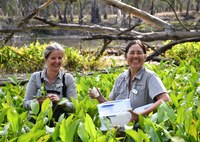Biological control of Sagittaria 2021 - 2022
Realising the fruits of our labour – Australia’s first release of a fruit-feeding weevil for the biological control of sagittaria.
YACTAC have joined forces with the Victorian Department of Jobs, Precincts and Regions (DJPR), Department of Primary Industries (NSW DPI) and Murrumbidgee Irrigation Limited (MIL) to support the biological control of the declared Weed of National Significance sagittaria (Sagittaria platyphylla).
The project "Realising the fruits of our labour - Australia's first release of a fruit-feeding weevil for the biological control of sagittaria" is the culmination of years of research to manage and reduce the impact of sagittaria in waterways. Sagittaria is an aquatic weed which grows aggressively in the Yanco Creek System and causes irrigation channels to block, hampers water flow, and obstructs wetlands and natural watercourses. Sagittaria has been invading waterways in south-eastern Australia since the 1960s - when it was imported from USA as an ornamental pond plant. It has since been declared a Weed of National Significance (WoNs).
The fruit weevil Listronotus appendiculatus is the insect species chosen for the control. The weevils feed on both the seed and fruit of Sagittaria which is an important step to containing it without reliance on chemicals, improving the health of waterways and agricultural productivity.
Fruit-feeding weevils have been reared in AgriBio facilities in Victoria and NSW and have been released in over twenty "nursery" sites in late 2021 and 2022. Weevils are left at "nursery" sites for populations to build before being collected and transferred to other infestations.
The Australia-first release of 50 weevils was at YACTAC's 'Fruit-feeding weevil workshop' on March 8th, 2022. It was attended by representatives of 11 organisations: YACTAC, Agriculture Victoria, Edward River Council, Murray Irrigation, Murrumbidgee Irrigation, Murray River Council, Berrigan Shire Council, Edward Wakool Angling Association, Yarkuwa, Ricegrowers' Association and Murray Local Land Services.
The program is the result of 17 years extensive research. Researchers have conducted stringent testing of the weevils over the last five years to ensure releasing them poses no threat to native species or other important plants in Australia.
Senior Research Scientist, Agriculture Victoria Dr Raelene Kwong said "This is a great example of advanced bioscience helping provide a long-term sustainable solution."






